Best Crypto Exchanges in Russia
.webp)
Summary: Cryptocurrency exchanges operating in Russia navigate a stringent regulatory landscape supervised primarily by the Central Bank of Russia (CBR). These institutions enforce strict rules on digital asset trading, money laundering prevention, and cross-border crypto transactions.
Here are the six best crypto exchanges accepting Russian Ruble (RUB) deposits:
Bybit is our top pick for Russian investors as the platform is accessible in Russian and it supports spot and futures trading, staking, crypto loans and copy trading services.
Fees
0.1% Spot Trading Fee
Available Assets
2,000+ Cryptocurrencies
RUB Deposit Methods
Bank Transfer, Cards, Sberbank, Tinkoff
Top Crypto Trading Platforms in Russia
Russian investors have several crypto exchanges that meet the regulatory standards set by the Central Bank of Russia (CBR) and the Ministry of Finance. This comparison table highlights the top crypto trading platforms available to Russian users, clearly detailing transaction fees, platform security, supported digital currencies, Russian ruble (RUB) deposit options, and key features.
1. Bybit
Bybit is Russia's best cryptocurrency trading platform, offering a Russian interface and customer support. Known for intuitive trading features and deep liquidity, it now boasts over 73 million registered users globally, with daily trading volumes exceeding $54 billion across both spot and futures order books.
Traders gain access to advanced financial products, including perpetual futures with leverage options of up to 200x, spot markets, options trading, and copy trading features. It also offers automated trading through trading bots, such as Grid Bot and DCA Bot, alongside the AI TradeGPT service.
Additionally, Bybit Earn lets users easily generate passive income through fixed and flexible staking, lending, and borrowing. Bybit has advanced cold storage solutions, stringent two-factor authentication, mandatory identity verification, and regularly undergoes proof-of-reserve audits.
Platform Highlights:
- Fees: Maker and taker fees from 0.1%; further reductions available for VIP-level traders.
- Supported Assets: Over 2,000 cryptocurrencies.
- Regulation & Licensing: Regulated by several global authorities and available in Russia.
- RUB Deposit Methods: Bank transfers, local card (Yellow & Green), e-wallets, Advcash.
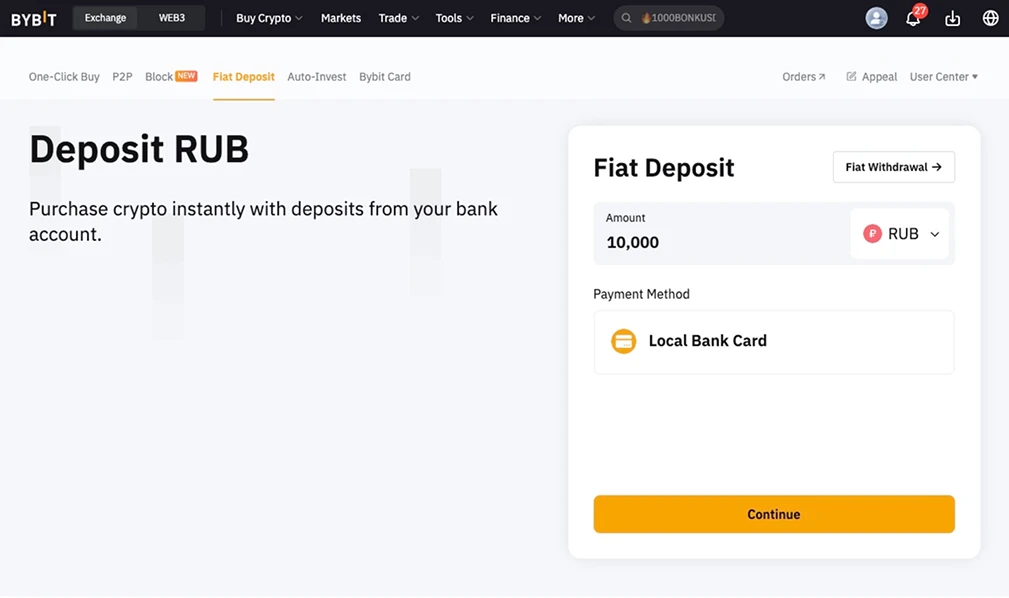
2. Gate
Gate is a leading exchange that has gained popularity among Russian investors due to its extensive variety of over 3,600 cryptocurrencies. Established in 2013, it now serves more than 32 million traders globally, processing over $37 billion in trading volume every 24 hours.
Its reputation in Russia stems from its unmatched selection of digital assets, from mainstream cryptocurrencies like stablecoins to emerging tokens and altcoins. Beyond its impressive asset diversity, it offers various trading types, including spot, futures, and options markets, plus copy trading.
Gate also offers Auto-Investment programs and Simple Earn, which enables users to generate yields with an APR of up to 11.26%. The exchange's native token, GateToken (GT), further enhances the platform's value by offering trading fee discounts and exclusive benefits.
Platform Highlights:
- Fees: Trading fees start at 0.2%, with discounts available via GateToken (GT).
- Supported Assets: Over 3,600 cryptocurrencies.
- Regulation & Licensing: Globally compliant and available in Russia.
- RUB Deposit Methods: Local cards (Green, Yellow & Red), SBP, bank transfers.
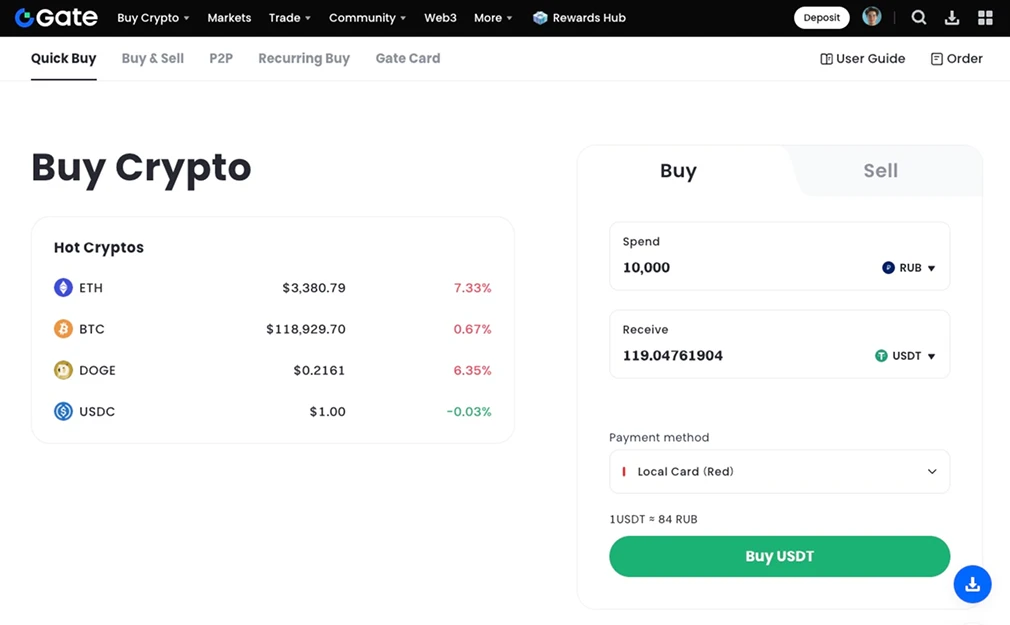
3. KuCoin
KuCoin is a major cryptocurrency exchange popular with Russian traders looking to explore altcoins and emerging crypto gems. Founded in 2017, it has rapidly grown into a global powerhouse, supporting more than 40 million users across Russia and over 200 other countries.
It offers a vast selection of 900+ digital assets for spot trading, plus over 400 derivatives contracts. Additionally, KuCoin Earn enables users to generate passive income through staking and structured savings products, while the Launch Hub provides early access to promising new tokens.
KuCoin prioritizes platform safety through encrypted asset storage, rigorous account security protocols, and independently verified Proof of Reserves (PoR). Russian-speaking users benefit from dedicated 24/7 customer support, intuitive mobile and desktop apps, and RUB deposit options.
Platform Highlights:
- Fees: Trading fees start at 0.1%, further reduced by using KuCoin Token (KCS).
- Supported Assets: Over 900 cryptocurrencies.
- Regulation & Licensing: Not directly regulated in Russia, but remains accessible in the country.
- RUB Deposit Methods: Credit cards, debit cards.
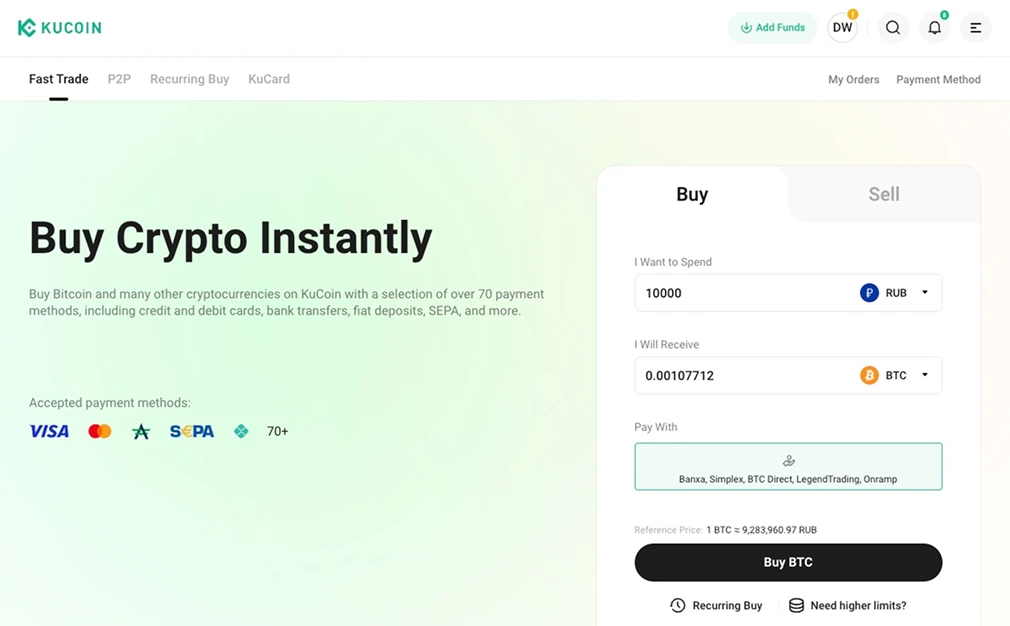
4. MEXC
MEXC is an expanding cryptocurrency exchange gaining popularity among Russian investors due to its extensive staking opportunities and exceptionally high annual yields. Established in 2018, it has substantial liquidity across more than 2,800 spot trading pairs and 1,300 derivatives contracts.
Users frequently choose MEXC for its low fees, competitive futures markets with leverage up to 500x, and unique promotions like daily USDT airdrops. The Earn program delivers impressive APYs up to 600%, providing substantial passive income opportunities through staking and savings products.
Security on MEXC includes an insurance fund to cover excess losses, industry-leading asset protection with over 100% reserve rates, and sophisticated cold wallet storage solutions. Russian users benefit from comprehensive language support and intuitive apps for both Android and iOS.
Platform Highlights:
- Fees: Zero maker fees, extremely low taker fees of 0.02% on futures.
- Supported Assets: Over 2,800 cryptocurrencies.
- Regulation & Licensing: Globally licensed and available in Russia.
- RUB Deposit Methods: Debit cards, credit cards, Payeer, Fast Bank Transfer, ЮMoney.
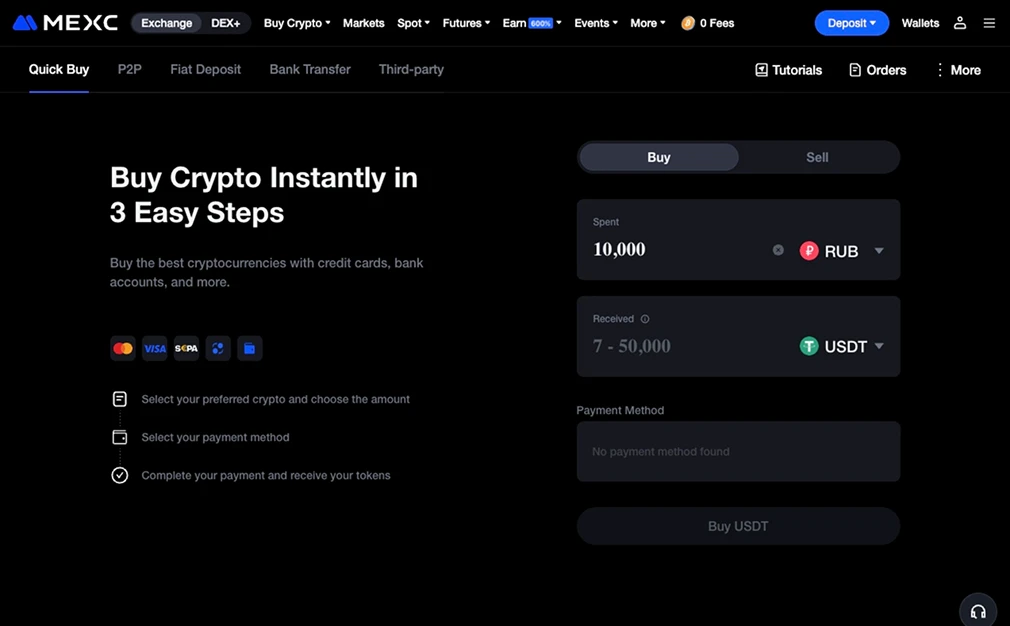
5. Bitget
Bitget is gaining traction among Russian investors due to its highly popular copy trading feature. Established in 2018, it processes daily volumes surpassing $2 billion. The platform lists over 800 digital assets, including its native Bitget Token (BGB), which offers fee discounts and special privileges.
The key feature is the copy trading platform, which allows investors to follow successful traders, replicating proven strategies to achieve impressive returns, often exceeding 500% monthly ROI. The exchange also provides advanced futures markets with competitive leverage options of up to 200x.
There is also spot trading, automated trading bots, margin trading, and a user-friendly "Earn" program for generating steady crypto income. The exchange safeguards user assets through a $765 million Protection Fund, maintains full Proof of Reserves at a 1:1 ratio, and employs secure offline cold storage.
Platform Highlights:
- Fees: Trading fees start at 0.02%, further reduced via Bitget Token (BGB).
- Supported Assets: Over 800 cryptocurrencies.
- Regulation & Licensing: Regulated across Europe and Asia, and accessible from Russia.
- RUB Deposit Methods: Debit and credit cards.
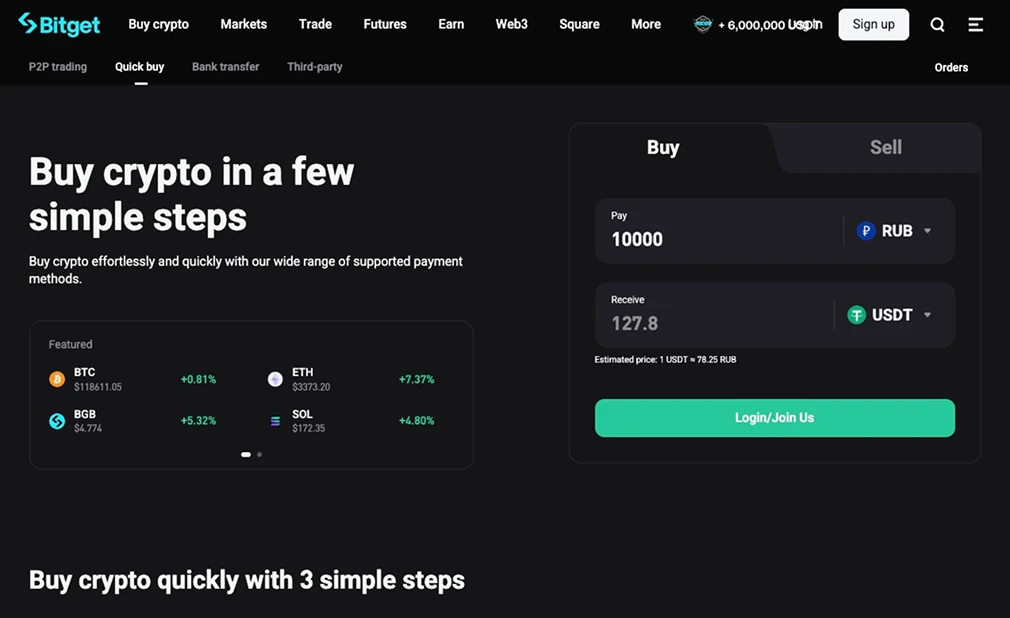
6. Phemex
Phemex is popular for its exceptional derivatives trading environment, offering up to 100x leverage across nearly 500 futures markets. Russian investors particularly appreciate its efficient trading engine, which delivers smooth transactions across 548 spot pairs and derivatives contracts.
The platform offers innovative products like automated trading bots, providing traders with over 23,000 active customized strategies to maximize profits. The platform also includes a robust lending and borrowing protocol, enabling instant crypto-backed borrowing at competitive rates.
Security remains paramount on Phemex, with most user assets securely stored offline using multi-sig cold storage wallets. Regular Proof of Reserves audits ensure transparent financial backing at a 1:1 ratio. Users benefit from a multilingual platform available through desktop and mobile apps.
Platform Highlights:
- Fees: Maker fees start at 0.01%, and taker fees around 0.06%.
- Supported Assets: Over 540 cryptocurrencies.
- Regulation & Licensing: Adheres to global KYC/AML regulatory standards and ensures high compliance.
- RUB Deposit Methods: P2P marketplace only.
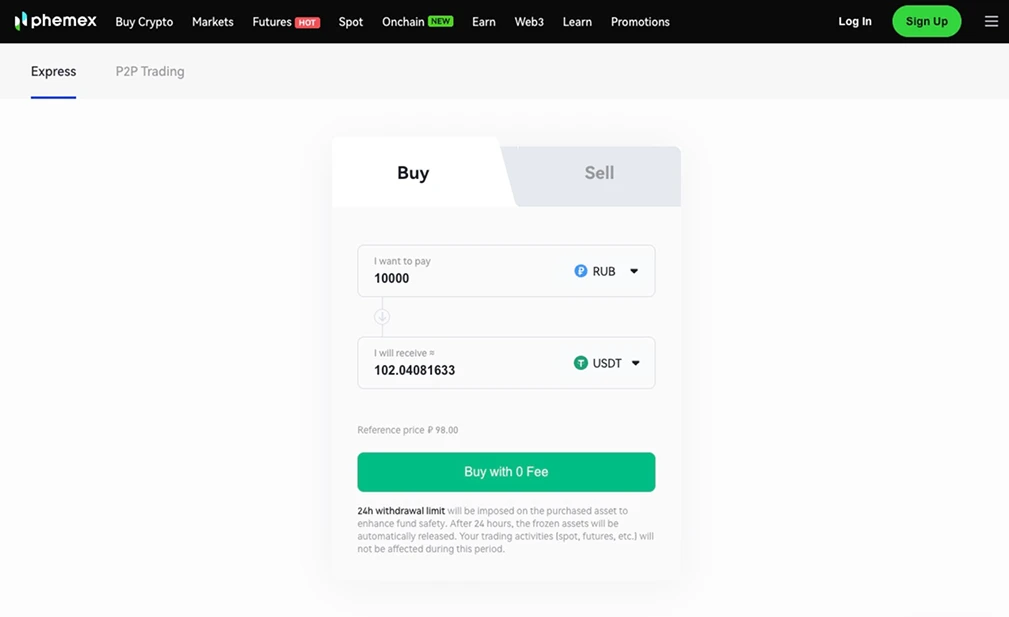
Is Crypto Regulated in Russia?
Over the past few years, Russia has transitioned from a cautious approach to a tightly controlled crypto framework, governed by the Central Bank of Russia (CBR) and the Ministry of Finance. Cryptocurrencies aren’t recognized as legal tender; they’re classified as property or digital financial assets, so domestic payments using crypto remain prohibited.
Russia also launched a “three‑year experimental legal regime” allowing “specially qualified” investors, individuals with at least 100 million RUB in assets or 50 million RUB in annual income, to trade crypto, derivatives, and digital assets via approved channels. A state‑backed exchange for these investors is in the works.
A key driver of this approach is geopolitical: Russia is increasingly using crypto to bypass Western sanctions through cross-border settlements, while simultaneously deploying tighter controls, with plans for blockchain-based monitoring systems by the end of 2025. At the same time, the launch of the digital ruble CBDC continues.
How is Crypto Taxed in Russia?
Since January 1, 2025, the Federal Tax Service (FTS) treats cryptocurrencies as property, bringing crypto gains in line with traditional capital and investment income.
- Individual Income Taxation: Individuals must pay personal income tax at 13 % on annual crypto earnings up to 2.4 million rubles, with a 15 % rate applied to any excess. If crypto income stays under 50,000 rubles per year, reporting and taxation are waived.
- Corporate Taxation: For corporate entities and registered miners, profits from mining and crypto trading face the standard 25% corporate tax. Importantly, mining and crypto transactions are exempt from value-added tax (VAT).
Tax liability will arise when mined cryptocurrency is converted into fiat, based on the asset’s market value at the time of sale, using rates from approved foreign exchanges. Failure to pay can result in administrative fines (ranging from 20% to 40% of the unpaid tax) and even criminal charges for cases of serious evasion.
Cryptocurrency Adoption in Russia
Cryptocurrency adoption in Russia is rapidly expanding, fueled by significant investor demand despite ongoing regulatory uncertainty. Around 44.29 million Russian users are projected to engage with crypto platforms by 2026, pushing user penetration from 29.06% in 2025 to 30.88% the following year.
This surge is primarily driven by investors seeking alternative financial opportunities amid economic volatility, along with clearer tax policies and increased institutional participation.
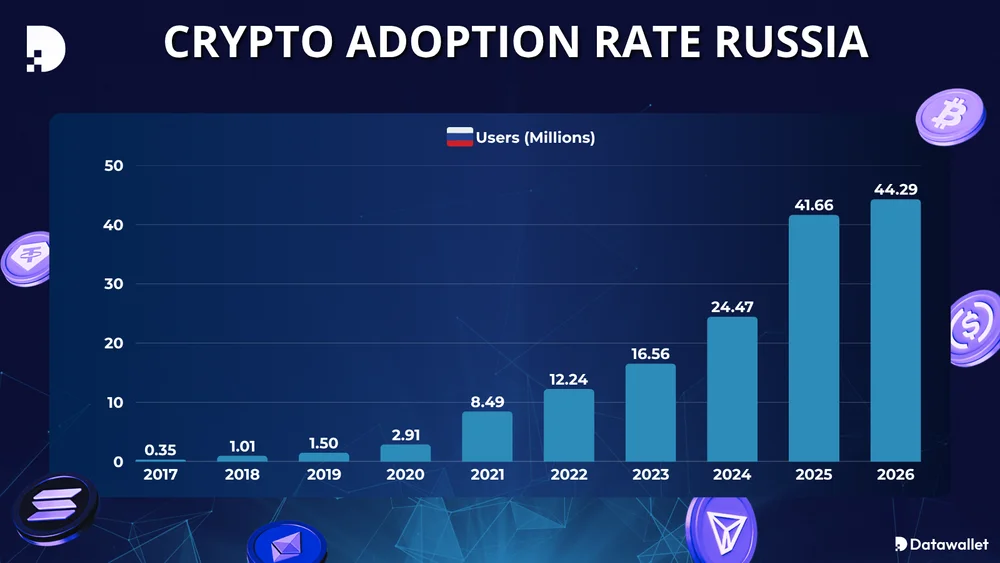
How to Buy Bitcoin in Russia
Russian investors looking to buy Bitcoin must select platforms that are compliant with the Central Bank of Russia's regulations. The following steps provide clear guidance for securely purchasing BTC in Russia:
- Choose a Regulated Exchange: Select a reliable platform operating within Russian regulatory guidelines, such as Binance, OKX, or Bybit.
- Open and Verify Your Account: Create an account on your chosen exchange and fulfill mandatory Know Your Customer (KYC) requirements. Expect to submit official identification documents, such as a passport, national ID, or driver’s license.
- Deposit Funds in RUB: Add funds to your trading account in Russian rubles (RUB). Leading exchanges in Russia typically support deposits through bank transfers, debit or credit cards, and alternative local payment methods like Yandex Money or Qiwi.
- Purchase Bitcoin: After funding your account, access the Bitcoin trading area of the platform. Enter the amount of RUB you'd like to spend or the specific Bitcoin quantity you want, then finalize your purchase.
After completing your Bitcoin purchase, you should transfer your digital assets to a secure personal wallet. Hardware wallets or reputable software wallets are strongly recommended, as they offer complete control and robust protection for your cryptocurrency holdings.
Final Thoughts
Russia’s top crypto exchanges offer a powerful mix of trading tools, staking opportunities, and RUB funding options, yet navigating this ecosystem demands awareness of its rigid regulatory framework.
While regulation remains stringent, there are trusted platforms such as Bybit, Gate, KuCoin, MEXC, Bitget, and Phemex, each offering unique strengths tailored to specific investor needs. Before selecting an exchange, carefully evaluate factors like asset diversity, deposit methods, fees, and security measures.
Frequently asked questions
Are crypto exchanges in Russia required to perform identity verification?
Yes, crypto exchanges accessible from Russia follow strict Know Your Customer (KYC) rules mandated by global AML standards. Traders typically must verify their identities with official documents like passports or national IDs before trading.
Can Russians use decentralized exchanges (DEXs) to bypass local regulations?
While decentralized exchanges (DEXs) are technically accessible in Russia, using them to circumvent regulatory requirements carries legal risks. Russian authorities emphasize compliance, meaning unregulated platforms might expose investors to financial and legal liabilities.
Is cryptocurrency mining legal in Russia?
Cryptocurrency mining is legal in Russia but strictly regulated. Miners must register with relevant authorities, report earnings to the Federal Tax Service, and adhere to regional energy usage restrictions.
Are cross-border crypto transfers legal under Russia’s experimental regime?
Yes. Under the three‑year experimental legal framework, businesses and “qualified investors” are permitted to engage in cross-border crypto payments. This model enables international settlements while maintaining strict domestic controls and supports sanctioned-asset bypass strategies.

Written by
Tony Kreng
Lead Editor
Tony Kreng, who holds an MBA in Business & Finance, brings over a decade of experience as a financial analyst. At Datawallet, he serves as the lead content editor and fact-checker, dedicated to maintaining the accuracy and trustworthiness of our insights.

.webp)


.webp)





